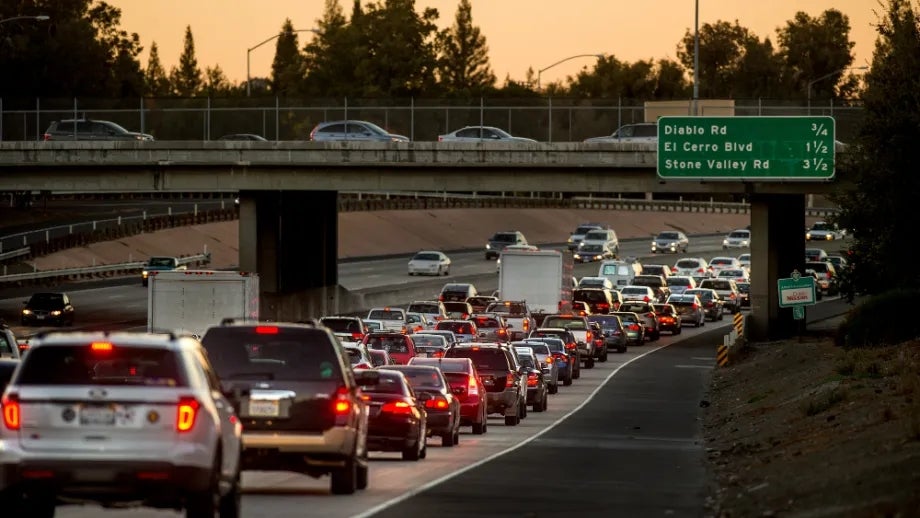MTC Seeks Feedback on Performance Targets Related to Federal Congestion Reduction and Environmental Sustainability Goals
The Federal Highway Administration (FHWA) has established requirements for performance management to ensure the most efficient investment of Federal transportation funds, support improved investment decision-making, increase accountability and transparency, and establish performance-based planning and programming.
As the region’s metropolitan planning organization, MTC – in coordination with the California Department of Transportation and regional transit agencies – is responsible for setting short-range performance targets to comply with federal law and support national transportation goals such as reducing traffic fatalities and improving highway infrastructure. FHWA established a total of 29 performance targets in the following federal goal areas:
- Safety
- Infrastructure Condition
- System Reliability
- Freight Movement and Economic Vitality
- Congestion Reduction
- Environmental Sustainability
MTC has already adopted five performance targets for Safety (learn more on Vital Signs). The rest of the targets will be discussed, debated and eventually adopted over the course of 2018.
To that end, MTC is currently seeking feedback from partners, stakeholders and the public on potential target options for three performance targets related to federal Congestion Reduction and Environmental Sustainability goals, specifically two- and four-year targets for the Congestion Mitigation and Air Quality (CMAQ) program for year 2020 and year 2022. These performance measures include:
- Annual hours of peak-hour excessive delay per capita by urbanized area (Traffic Congestion)
- Percent of non-single occupant vehicle (SOV) travel by urbanized area (Commuting)
- Total emissions reductions from CMAQ-funded projects by pollutant
For a technical, detailed look at the various targets under consideration, please read this memo. The thrust of the current debate is whether the targets should be aspirational or achievable, based on current trends or on desired trends. Staff is looking for feedback and guidance from stakeholders and the public by April 17, 2018, on the potential approaches outlined in the memo.
For more information on the Federal Performance Targets effort, visit the project "hub" on MTC's website. For detailed performance monitoring data and analysis of the required federal transportation performance measures, be sure to check the Vital Signs website as more targets are added over the course of 2018.
Questions and comments about federal performance target-setting activities should be directed to David Vautin at dvautin@bayareametro.gov.
Submit your comment
In order to receive a reply to your comment, please provide an email address.


Dear MTC;
We should be embarrassed, as Californians, that we are struggling to follow rather than lead the Federal Government on this issue. To me this process is clearly emblematic of our problem; namely that established economic interests are setting transportation planning in the Bay Area. Based on our predicament, that we cannot continue with the present transportation models, in their current ratios, because it will eventually kill all of us; we need to recognize that the large part of transportation planning is removing cars from the freeways.
In this sense, transportation planning is social planning on a large scale. We should be smart enough to do this; but only if we are willing to speak truth to power.
Obviously, we have not only exceeded our roadway capacity; but we have exceeded the absorption capacity of the destination cities. Even if the transportation were perfect; we have an increasing problem in all associated sectors. We must stop using gas tax money to try to leverage our way out of not needing gas tax money. This is crazy.
The problem is not public participation, BTW; it is breaking through the conventions that control what ends up in the plans.
Suburban communities suffer from split families and non-participation of commuters in local government, schools, and other issues. Families suffer from absent parents. The entire Bay Area region suffers from a lack of resiliency. President Obama came to the realization that fossil fuels need to stay in the ground. How do we convert this physical reality into public policy? I am happy to participate in work that matters, but will avoid work that will inevitably "drive" us deeper into a dead end. I believe a viable Bay Area future rests in a combination of decentralization; effective, robust public transportation; tolls that require automobiles to pay the real costs of their use; and ultra high-speed internet to surrounding communities, coupled with commercial development incentives outside the fully impacted Bay Area proper.
Yours,
Bill Mayben